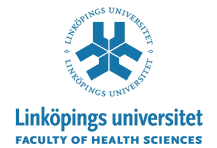 |
Visa svensk kursplan |
|
COURSE CATEGORY Single subject course MAIN FIELD OF STUDY Medicinsk biologi - MBI SUBJECT AREA |
COURSE CODE | 8FA056 |
Learning Outcomes
By the end of the course the students will be able to:
-Describe the chemistry of free radicals and use basic detection methods to estimate free radical production by fingerprinting and trapping methods
-Exemplify free radical-induced damage/modification to cellular macromolecules and outline the consequences in terms of cell signalling, adaptation, repair mechanisms and cell death
-Apply the principles of antioxidant protection and outline the general mechanisms of free radical defence in the human body
-Evaluate the influence of free radicals in ageing and disease, and integrate the knowledge about free-radical formation, the induced damage and radical defence for designing experimental models.
-Present scientific papers and evaluate and criticize theír methodology and conclusions and argue for alternative methods.
-Free radicals induced by irradiation and toxic substances
-Cellular damage caused by free radicals; adaptation, repair and cell death
-Free radicals and disease; atherosclerosis. ischemia, diabetes and cancer
-Nitric oxide and cellular signalling
-Antioxidants
-Glutathoine and cellular redox systems
-Importance of transition metals; iron metabolism
-Defence against micro-organisms; inflammation
-Redox reactions in plants; the chloroplast
-Radiobiology
-Detection methods (e.g. fingerprinting and trapping)
The educational method used is problem-based learning (PBL). PBL emphasises the students development if free, self-supporting, lifelong learning ability as an instrument for critical inquiry. The student´s own queries and the problems formulated form the basis of PBL. What is also important is the student´s ability to take responsibility for his/her own learning, and to seek and evaluate information and knowledge as well as to develop co-operative skills and a flexible attitude to different views and ideas.
Students who have failed the course or part of the course twice are entitled to request another examiner for the following examination occasion.
Extent of re-examination
The extent of a re-examination shall be similar to the regular examination.
Entries for re-examinations
Rules for entries for examination are given in the course plans. In addition the "Regulations regarding examinations and examiners" laid down by decision of Linköping Universitys (Dnr: LiU 1109/00-40) apply.
Applicants with a degree from a non-Swedish university must enclose an official examination certificate of at least three years of full-time studies in subjects with relevance for Life Science, such as biology, chemistry, medicine or similar.
Documented knowledge of English equivalent to ”Engelska B”; i.e. English as native language or an internationally recognized test, e.g. TOEFL (miminum scores: Paperbased 550 + TWE-score 4.0, computerbased 213 and internetbased 79), IELTS, academic (minimum score: Overall band 6.0 and no band under 5.0), or equivalent.
Planning and implementation of the course shall be carried out on the basis of the wording in this course plan. The evaluation of the course plan should therefore consider the question how well the course agrees with the course plan. Written evaluation will be arranged at a scheduled time at the end of the course.
Electronic evaluation of the course will also take place in accordance with Linköping University´s regulations (Dnr LiU 780/06-04).
Certificate
At the students request a course certificate may be issued by the director of studies for courses or, according to delegation, by the head of the department/director of programme studies.
Additional Information
The course is given in such a way that both men´s and women´s experiences and knowledge are foregrounded and developed.
If the course is withdrawn, or is subject to major changes, examinations according to this course plan are normally offered on a total of three occasions within one year, one of them in close connection with the first examination.
|
||||||||||||||||||||||||||||||||||||||||||||||||||||||||||||||||||||||||||||||